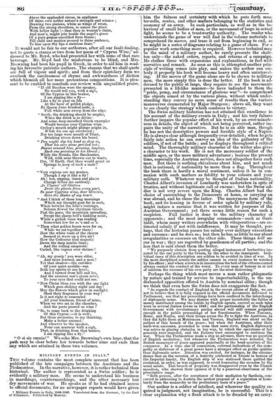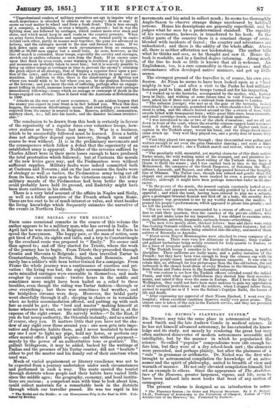MILITARY EVENTS IN ITALY. * Tills volume contains the most complete
account that has been published of the late campaigns between the Austrians and the Piedmontese. In the narrative, however, it is rather technical than historical. The author is represented as a Swiss soldier ; he is evidently a military man. He seems to understand his business in marcbings, countermarchings and the other necessary but dry movements of war. He speLks as if he had obtained access to official documents; for no newspaper reports would have given a Military Events in Italy, 1848-1849. Translated from the German, by the Earl of Ellesmere. Published by Murray.
him the fulness and certainty with which he puts forth mus- ter-rolls, routes, and other matters belonging to the statistics and economy of an army. In such partioulars, as well as in the be- haviour of small bodies of men, or the movement of large in actual fight, he seems to be a trustworthy authority. The reader who understands the game of war will find in the volume materials to comprehend its moves, and true it out from beginning to end, as he might in a series of diagrams relating to a game of chess. For a popular work something more is required. However technical may be the mind of a military author, he rarely presents the skele- ton only--the naked orders, reports, and returns of a campaign. ..He clothes these with expansions and explanations, in fact with narrative and remark. As soon as this is attempted another prin- ciple of writing comes into play, and unless the author can em- body it properly his book will become heavy and often uninterest- ing. If the moves of the game alone are to be shown to military men, the more simply this is done the better. If the book is ad- dressed to the public at large, they require to see the movements presented in a lifelike manner—to have indicated to them the "pride, pomp, and circumstance of glorious war "—to comprehend the objects aimed at by the various plans, without which under- standing they convey no more sense of results than the various manceuvres enumerated by Major Sturgeon; above all, they want to see clearly the strategy which conduces to victory.
• The Swiss military historian has not attained this excellence in his account of the military events in Italy; and his very fulness further impairs the popular effect of his work, by an over-minute- ness in details, the object of which not being perceived, rather im- pairs the unity of the narrative. But he is an able man, though he has not the descriptive powers and forcible style of a Napier. He is always clear although frequently over-detailed; when he gets fairly into action he can convey an idea of the gallantry of the soldiers,, if not of the battle ; and he displays throughout a critical mind. The thoroughly military character of the writer also gives a character to his work. He is not the mercenary soldier of the middle ages or the mere militaryadventurer ; because the present time, especially the Austrian service, does not altogether form such men. But there is nothing chivalrous about him, and not much that is national, if nationality be more than a flag. Throughout the book there is hardly a moral sentiment, unless it be in con- nexion with such matters as fidelity to your colours and your military oath. Whatever may be thought of Italian nationality, Charles Albert's invasion of Lombardy was undertaken in spite of treaties, and without legitimate call or excuse : but the Swiss gel- dier is not very severe upon the King. Charles Albert had the choice of succumbing to the Democrats at home, or carrying on war abroad, and he chose the latter. The anonymous form of the book, and its leaning in favour of order upheld by military rule, might induce a surmise that it was written for purposes of the Austrian Government; yet there seems little reason for such a suspicion. Full ,justice is done to the military character of opponents ; and the most irregular commanders—such as Gari- baldi, whom many writers overwhelm with vituperatives—are es- timated calmly if not with indifference. It may be thought, iier- haps, that the laistorian passes too calmly over military executions and excesses : and he does so ; but then he has as little to say about irregularities or excesses on the other side. These things will ock cur in war ; they are regretted by gentlemen of all parties; and the less that is said about them the better.
"We purposely abstain from quoting alleged instances of barbarities im- puted by the one party to the Croats, by the other to the insurgents. Indi- vidual cases of this description are seldom to be avoided in time of war. • In the most disciplined armies the soldier cannot in every instance be watched by his officer; and when a town lain insurrection the best of the citizens cannot always control the conduct of the worst. To every man of honour in or out of uniform the excesses of his own party are the most distressing."
Perhaps the thing which most moves a man rather phlegmatic by nature end trained by service to imperturbability-, is the un- derhanded opposition offered to Austria by nominal allies ; though we think that even here the Swiss does not exaggerate the fact. "As regards the conduct of England in the recent affairs of Italy, we are not to believe that it is fully exposed in the official documents delivered to Parliament, nor that her proceedings have been confined to the interchange of diplomatic notes. We may dismiss with proper incredulity the fables of money distributed among the rabble by English agents, current as such tales were in several Italian towns in 1848; and the partisanship of the English Government with revolutionary parties abroad will still remain palpable enough in the public proceedings of her functionaries. When Tuscany, Borne, and Naples, sent their troops across the Po to fight the Austrians, as they did fight them at Montanara and Vicenza, England was silent on the subject of this breach of the peace ; but when the Austrians, after their hard-won successes, proceeded to cross that same river, English diplomacy was active in placing obstacles in her way, by which the operations of her generals were impeded, and the Italians were encouraged to continue the war. When the Piedmontese made a step in advance, there was no question of English mediation ; but whenever the Piedmontese were defeated, the British messenger of peace appeared punctually at the head-quarters of the conqueror. In a time also of commotion, external indications of the sym- pathy or disfavour of a great power have a stronger effect on public opinion than diplomatic notes. Attention was excited, for instance by the stance that on the occasion of a festivity celebrated in rated at Trieste n honour of the Imperial family, the English ship of war stationed there quitted the roadstead, in order, as was supposed, to avoid honouring the oceasum by the usual salute. This breach of propriety was disapproved even by the French squadron, who showed their opinion of it by a punctual observance of the prescriptive usage.
"Both powers, after the acceptance of their mediation by Sardinia, con- curred in addressing to Austria the modest proposal of a separation of Lom- bardy from the monarchy as the preliminary basis of a peace."
Our author is a soldier of intellect, and wherever the quality
' is is judgment, not imagination he is successful. This s a clear explanation why a flank attack is to be dreaded by an army. "Unprofessional readers of military narratives are apt to inquire why 80 much importance is attached to attacks on an enemy's flank or rear. It seems an easy matter to wheel and form a fresh front. This is true enough of a company, a battalion, or even a brigade, au parade; but in war the fighting men are followed by carriages, which cannot move over stock and stone, and which must keep to such roads as the country presents. When an army forms front, battalions and squadrons are formed partly in ranks behind each other, partly in masses near together, the guns are advanced in battery, and the carriages moved to the rear and formed in ranks. If we look down upon an army under such circumstances from an eminence, 20,000 or 30,000 men appear but a small body. As soon however, as the line of march is extended, these troops, especially the cavalry and carriages, stretch out in endless columns as seen from the flank. If an enemy came upon that flank by cross-roads, some warning is doubtless given by patrols, and measures are probably taken to meet him ; but it is scarcely possible to bring up either troops or carriages in time to prevent the enemy's attaining the great object of all strategy, that of flinging a superior force upon a por- tion of the army, and to avoid suffering from a deficiency in guns and am- munition. In addition to this, there is the disadvantage of fighting not where you would wish to be but where you are, be the 'midden favourable or the reverse ; and you incur the risk of suffering, perhaps after an engage- ment trifling in itself, immense losses in respect of the artillery and carriages immediately following—losses which no courage or contempt of death in the troops engaged can obviate. Thus it fared with the Austrians at Hohenlinden in 1800.
"Attacks on the rear are of rarer occurrence. It can seldom happen that the enemy you expect in your front is in fact behind you. When this does happen, the enormous disadvantage occurs, that everything you most wish removed from the enemy is nearest to him. Reserve artillery, ammunition, military chest, &c., fall into his hands, and the disaster becomes irretriev- able."
The conclusion to be drawn from this book is certainly in favour of the superiority of a regular force over volunteer troops, how- ever zealous or brave these last may be. War is a business, which to be successfully followed must be learned. Even a battle does not altogether depend upon bravery, though it cannot of course be won without. It is in the preliminary movements and the consequences which follow a defeat that the superiority of an established army is apparent. Neither of the reverses suffered by Charles Albert were in their mere losses enough to have produced the total prostration which followed ; but at Custozza the morale of the new levies gave way, and the Piedmontese were without sufficient supplies. Military faults were indeed committed both at Custozza and Novarra ; and on the last occasion the faults were of strategy as well as tactics, the Piedmontese army being cut off from its base which was open to the victorious enemy : but if the military morale of the Piedmontese had been better the army could probably have held its ground, and Radetzky might have been more cautious in his attack.
There is a very brief account of the affairs in Naples and Sicily, as well as a fuller narrative of the French attack upon Rome. These are too curt to be of much interest or value, and want besides the living knowledge which frequently animates the narrative of the events in Northern Italy.



























 Previous page
Previous page